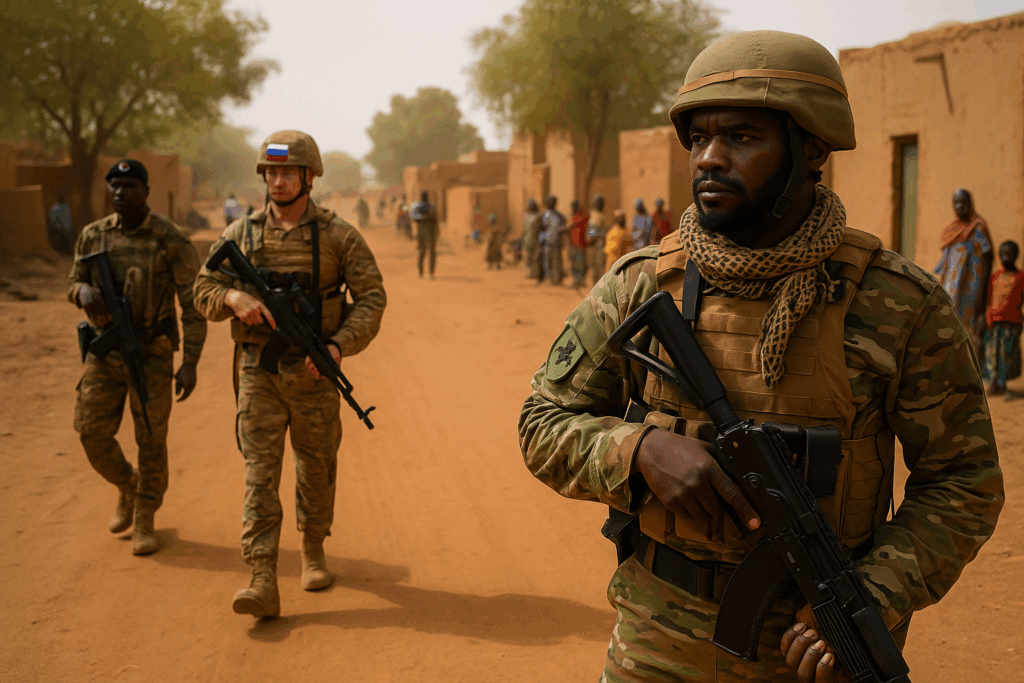

Prefer to listen instead?
Hear the full breakdown of the Sahel crisis—where military coups, foreign mercenaries, and forgotten civilians collide. Brought to you by Pixlehale: where world news gets the depth it deserves.
By the Pixlehale International Desk
Filed from Dakar, Niamey, and Ouagadougou
A Region on Fire: Coups and Collapse
Since 2020, all three nations have experienced coups, replacing fragile civilian governments with military regimes. The new rulers quickly distanced themselves from Western influence, particularly France, expelling diplomats and troops, severing old ties, and forming the Alliance of Sahel States (AES)—a mutual defense pact now at the heart of the region’s transformation.
What followed was a surge in violence and strategic realignment. Armed Islamist groups affiliated with al-Qaeda and ISIS continue to launch attacks across rural areas, but now the counteroffensive is led not by Western-trained armies, but by soldiers operating with the support of Russia’s Africa Corps—the rebranded shadow of the Wagner Group.
Russia Moves In: The New Power Broker
Human rights observers in the region tell Pixlehale the new operations are often brutal and indiscriminate. A report provided by a local official in Mopti, Mali, detailed a March operation in which over 30 civilians were allegedly executed after being accused of harboring jihadists. In Niger, field correspondents observed Russian personnel overseeing training exercises just outside Niamey—a presence denied by local authorities but confirmed by satellite analysis.
Civilians in the Crossfire
Beyond the violence lies a humanitarian disaster. As of May 2025, over 5.1 million people have been displaced across the region, with Burkina Faso alone accounting for more than 2.1 million internally displaced persons (IDPs). Food insecurity is rising sharply, with nearly 20 million people projected to face crisis-level hunger by year’s end.
Local infrastructure is crumbling under the weight of conflict and political instability. School closures are rampant. Vaccination programs have stalled. One aid worker stationed in Dori, Burkina Faso, told us that “entire regions are falling off the map—no communications, no clinics, no law.”
Democracy Retreats, Authoritarianism Advances
Economically, the fallout is steep. Foreign direct investment has plummeted by over 60% in the past 18 months, while trade routes are increasingly militarized or abandoned. Meanwhile, AES governments justify the turn toward Moscow as necessary for “true sovereignty.”
But what’s truly happening is the quiet militarization of an entire region—with global consequences. This isn’t just a fight against extremism. It’s a proxy battleground between democratic and authoritarian models of governance. As the West retreats, Russia—and increasingly, China—step into the vacuum, offering security guarantees, weapons, and infrastructure deals without strings like human rights or press freedom.
A Strategic Region, Quietly Slipping Away
What’s being lost in the process is not just civilian life, but democratic momentum, press accountability, and the rule of law.
“This is the most consequential shift in the Sahel in a generation,” says a retired West African diplomat who requested anonymity. “We’re not just losing territory. We’re losing the region’s political future.”
And with it, the global order loses a strategic belt of nations at the crossroads of migration, extremism, and mineral wealth.
The question now is not whether the Sahel is in crisis—it is. The question is: who benefits from the chaos?